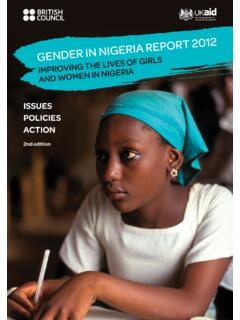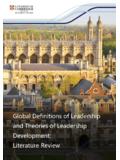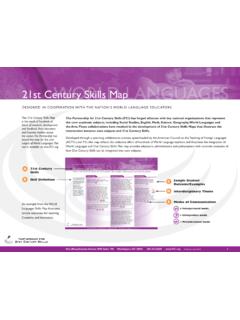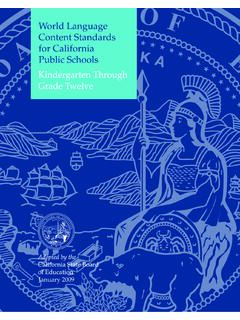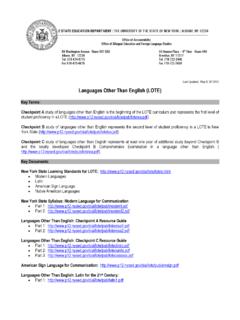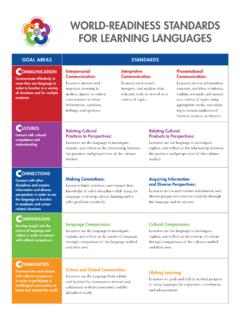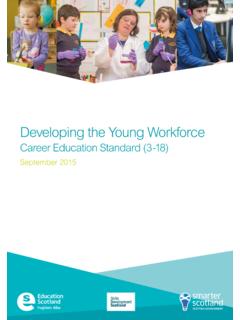Transcription of Languages for the future - britishcouncil.org
1 Languages for the futureWhich Languages the UK needs most and report was commissioned by the British Council and prepared by Teresa Tinsley and Kathryn Board of Alcantara Tinsley is a linguist with over 30 years experience in national organisations devoted to Languages education. At CILT, the National Centre for Languages , she led the organisation s information, research and publications activities. She established CILT s language Trends series of reports and produced statistics and policy developments published as Languages Yearbooks 1995 2007.
2 She was involved in several European research projects on multilingualism and is a member of the European Commission s Languages in Education and Training group. Since founding Alcantara Communications, she has conducted policy research on Languages issues for clients including the British Academy and CfBT Education Board was Chief Executive of CILT, The National Centre for Languages from 2008 and has worked with specialists and a wide range of educational institutions to provide advice on educational policy as well as on initiatives aimed at increasing language learning across the UK.
3 Before joining CILT, she spent 30 years working for the British Council in a number of international and management roles. Now partially retired, she continues to work on research projects where she can bring in her expertise. Kathryn speaks Spanish, German and Dutch and is working hard on improving her Communications provides expertise to national and international organisations, private companies and third sector bodies on language education policies, multilingualism and Languages in employment and undertakes research and analysis in this the british CounCiLThe British Council is the UK s international organisation for educational opportunities and cultural relations.
4 We create international opportunities for the people of the UK and other countries and build trust between them work in more than 100 countries and our 7,000 staff including 2,000 teachers work with thousands of professionals and policy makers and millions of young people every year teaching English, sharing the arts and in education and society are a UK charity governed by Royal Charter. A publically-funded grant-in-aid provides less than a quarter of our turnover which last year was 781 million. The rest we earn from English teaching, UK exams and services which customers around the world pay for, through education and development contracts and from partnerships with other institutions, brands and companies.
5 All our work is in pursuit of our charitable purpose and creates prosperity and security for the UK and the countries we work in all around the more information, please visit: You can also keep in touch with the British Council through and 2 Executive summary 3 Introduction 4 The UK s language challenge 6 Identifying the Languages the UK needs 10 Conclusion and recommendations 19 The top ten Languages 22 41 Appendix: Matrix of language indicators weightings and scores 42 Languages for The future 1forewordOn a poster on the wall in a university in Beijing, I recently read these remarkable words from Nelson Mandela: If you talk to a man in a language he understands, that goes to his head.
6 If you talk to him in his own language , that goes to his heart. Nearly 1,000 people were taking their English exams that am proud to work for an organisation which offers millions of learners worldwide access to the education, job opportunities and social mobility that English brings. But in the UK we must accept that speaking English alone is not enough in a world where multilingualism is becoming the can be no doubt that the UK needs more of its people to speak foreign Languages for employability, for trade and the economy, and for our cultural life.
7 But, let s be honest, there are big barriers to this. So many people worldwide do speak English, and learning foreign Languages in the UK has often been seen as an academic pursuit rather than a vital skill. Much of this revolves around the difference between being fluent or functional in a language . The British Council s experience of English language teaching is that what matters most is being able to understand and to be understood; whether the need is for basic vocabulary to give directions to a taxi driver or for a more extensive vocabulary to be an international business is hard to know, especially at a young age, which language is likely to be of most use.
8 So perhaps a more functional focus having enough might be the key to promoting language learning in the UK. Not to impoverish or lessen the academic or cultural value of long-term language study, but to increase the number of people who feel able not unable to travel, explore, navigate and engage at some level with people in other analysis of economic and cultural indicators in this report suggests not that people in the UK are learning the wrong Languages , but that we need far more people learning a much wider range of Languages in the future .
9 French, Spanish and German will continue to be important but we will also need significantly more Arabic, Mandarin Chinese and Portuguese speakers as well as speakers of Italian, Japanese, Russian and is worth remembering that when we think of Languages in the UK, we tend to think of going away . However, given that Japanese car manufacturers, Chinese infrastructure developers and French utility companies all make huge contributions in the UK, you do not need to cross the equator or even the English Channel to find situations and jobs where even a little Chinese, Japanese, or French can be a real career or ten phrases will enable most people to navigate many countries at a basic level.
10 1,000 words can be enough to feel autonomous, confident and secure in another country and brings some cultural understanding. Fluent is an inhibitor, functional is a liberator. It begins with a few words and phrases and that small investment can grow into a lifetime of interest, employment and WorneDirector of strategy, British CouncilJohn Worne is responsible for the British Council s global strategy, governance, web and digital presence and reputation. He writes and speaks on the value of culture and the importance of Languages and international skills for the UK s young people.





